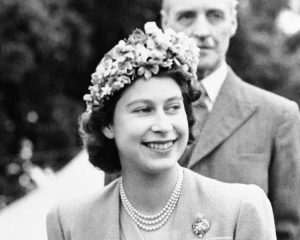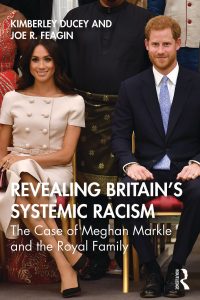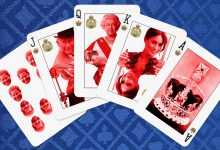“I hope that yet more prominent voices will increase their emphasis on an array of systemic issues”
Dr. Kimberley Ducey
Dr. Kimberley Ducey – associate professor in the Department of Sociology, Faculty of Arts The University of Winnipeg, and co-author of the book that will be released on April 1 – helps us to understand the historical reasons for Canada’s connection to the British monarchy and the impact that the successive scandals shaking the English court can cause, not only in England, but in all countries linked together by Queen Elizabeth II.

Milénio Stadium: The history of Canada’s connection to the British crown is confused with the history of the founding of the country itself. In your opinion, looking back in time (to 1867), did the provinces that joined federation have alternatives? Or was being under the purview of the British crown the only opportunity to build this country, as we know it today?
Dr. Kimberley Ducey: Being under the purview of the British Crown was arguably the best gamble for the Fathers of Confederation, especially given their mammoth suspicions concerning US annexation plans. Because the British North America (BNA) colonies were on the threshold of a governmental restructuring that would result in the creation of Canada, it is fascinating to explore the impact of the American Civil War on Confederation in 1867. The American Civil War had a colossal impact on the BNA colonies. For example, continental and transatlantic trade was affected, as the war generated friction across the entire North American continent. The fear of annexation played an unmistakable part in the realization of Canadian Confederation and in influencing its constitution. Leaders in the BNA colonies believed the American Civil War resulted from the divisiveness of American federalism. Consequently, the Fathers of Canadian Confederation determined that Canada needed a firmer federal government than the US possessed. While the explanations for the Confederation of Canada in 1867 are numerous and diverse, the American Civil War spurred on the movement. Among the key crises were the 1861 Trent Affair, the 1863 Chesapeake Incident, and the 1864 St. Albans Raid. In sum: a protectionist US trade policy; fears of US aggression and expansion following the American Civil War (1861–1865); and Britain’s increasing lack of enthusiasm to pay for the defence of the BNA colonies led to Canadian Confederation, which offered Britain a way to streamline its financial and military responsibilities in North America. What’s more, Canadian Confederation gave the BNA colonies strength through a confederacy (alliance).
MS: Despite British domination, the French faction remained very present in the territory. How can one analyze the fact that, in theory, we have subjects of Queen Elizabeth II living in Canada, whose language and roots are based in French culture?
KD: To be sure, after more than 260 years, the continued existence of the British Crown at the top of Canada’s constitutional order is an enduring reminder that the English and the French once waged war against one another. But the historical relationship between the two groups is striking for its ups-and-downs. Expectedly, following Great Britain’s 1759 conquest of New France (French La Conquête), there was much animosity between the French and the English. In 1837 and 1838, French Canadian fighters in Lower Canada took up arms against the British Crown. But after the 1837-1838 revolts, support for the British monarchy increased in Québec, primarily—argue historians—because the British Crown protected French Canada’s language, religion, and laws from U.S. assimilation. Historians argue that the British Crown was viewed by the French as a defense against annexation to the U.S..
MS: Looking at the history of the British monarchy, we realize that the instability caused by family scandals has long threatened its future. In fact, everything has been overcome or circumvented. What could the rupture of Meghan Markle and Prince Harry’s allegations against the Queen’s family or ‘The Firm’ as they called them, bring?

KD: To begin, it is worth noting that overwhelming opinion amongst royal experts is that it is unlikely that the British monarchy will hugely be impacted by Markle and Harry, including via the Oprah interview. These experts generally believe that the couple will have no long-term or fundamental bearing on the monarchy given that the sole members of ‘The Firm’ with a constitutional role are the reigning Queen or King and the heir apparent. Every other royal, according to this view, are bit players. Also, these experts note that the republican movement (i.e., political movement that seeks to
replace the UK’s monarchy with a republic. Supporters of the movement, called republicans, support an elected head of state) is minor and thus the British monarchy is not disappearing any time soon.
As for how the British royals overcome and circumvent threats to their existence: having their pulse on the importance of mass appeal, and their strategic approach to achieving approval and acceptance, is arguably the most important reason why the British Royal Family has outlasted or overshadowed other European royal houses; or as you say, every crisis “has been overcome or circumvented.” Acceptance amongst the masses has been acknowledged as crucial to the survival of ‘The Firm’ since at least 1917, when George V ordered all British royals to dispense with the use of German surnames and titles because of anti-German sentiment during World War I. This included changing his surname from the Germanic Saxe-Coburg-Gotha to the very English sounding Windsor.
Nowadays, the British royals’ popularity among Britons is regularly measured by opinion polls. YouGov Poll ratings, for example, gauges the popularity and prominence of the most senior royals on a positivity scale. According to a March 2021 YouGov poll, the popularity of Markle and Harry plummeted in Britain and has never been lower than following their interview with Oprah. Corresponding media accounts reported that 48 percent of the 1,664 respondents polled had a negative view of Harry compared to 45 percent who said they viewed him positively. This was the first time his net favourability rating has been negative. Notably, too, this was a fall of 15 points from just a week earlier. Three in 10 Britons polled said they viewed Markle positively, while 58 percent had a negative opinion of her following the Oprah interview. As with other polls conducted since the Oprah interview aired (up to today’s date, March 24, 2021 at least), a marked division between generations is a pattern. A majority of respondents aged 18 to 24 report that they like Markle and Harry, while respondents aged 65+ overwhelmingly report negative feelings towards the couple.
The only other member of the family to see their popularity fall after the Oprah interview was Prince Charles. According to the same survey, 42 percent of respondents now hold a negative view of him, compared to 49 percent with a positive view. It is interesting to compare Charles’ popularity to that of Elizabeth II, who was liked by 80 percent of respondents following the Oprah interview. William and Kate were popular with three-quarters of respondents following the Oprah interview.
A separate poll, conducted partly before the Oprah interview was broadcast in Britain, found support for the monarchy stood at 63 percent. 25 percent of respondents reported a desire for an elected head of state, instead of a monarch.
Arguably, the British royals should be concerned. Among the youngest age group, support for an elected head of state was higher than for the monarchy by 42 percent to 37 percent—although YouGov said this was within the margin of error.
MS: Recently in the interview with Oprah Winfrey, Meghan and Harry made accusations never heard before. Namely, racism and negligent attitudes towards Meghan’s alleged mental health problems. In your view, what consequences can be expected? Can the British royal family suffer a serious shock or will it again overtake and drown out all the noise generated around it?
KD: To begin, Piers Morgan’s recent tirade against Markle’s revelations of her mental health struggles, including the new disclosure to Oprah that she experienced suicidal thoughts, is not novel among white media pundits in the U.K. Criticism by white royal watchers and public relations experts was rife after the ITV documentary Harry and Meghan: An African Journey aired in 2019, carelessly propagating dangerous messages about mental health. At the time, Piers Morgan asked people to imagine “being two staggeringly privileged royal multi-millionaires going to Africa to make a documentary that supposedly ‘shines a light’ on poverty, violence against women/girls & racial inequality – then in fact making it all about their own terrible struggle.” Contrary to the claims and many other white media pundits, the ITV documentary was not “all about their own terrible struggle.” According to my calculations, a fifth of the documentary focused on the couple’s personal struggles. Roughly 11 percent of the film was dedicated to Markle’s frank comments about the British tabloids’ unfair coverage of her. The documentary was far from being just about the couple’s (very real) personal struggles.
I am not optimistic that the British royals genuinely and categorically ‘get it’ or even want to change, even as a new report from The Guardian claims that ‘The Firm’ is actively looking into diversity training, specifically by hiring a “diversity tsar” to “modernize the monarchy.” Apparently, the possible new hire is a consequence of an internal review of royal policies, which ‘The Firm’ supposedly found to be particularly wanting when it came to diversity. I won’t hold my breath that this will be more than a public relations ruse or a Band-Aid. That the Queen has not apologized, for example for the centuries of African slavery and the slave trade, is symptomatic of an absence of regret, of antipathy to addressing historic wrongs, and of a disingenuous commitment to multiracial Britain. I hope I am proved wrong, however. But I think the Band-Aid solution will likely allow the royals to overtake and drown out most of the noise generated by the Oprah interview.
We need only look to Prince Andrew to see just how effective the royals are at masking out what they want muzzled. When asked by the BBC journalist in the notorious November 2019 interview, “is there anything more you’d like to say” to convicted sex offender Jeffrey Epstein’s victims, Andrew could not at that time conjure up a single word of sympathy for his friend Epstein’s many young victims. Yet, major publications like Town & Country, whose audience mainly consists of socialites and middle-class professionals, seemed to defend him. That publication noted that Andrew had elsewhere offered Epstein’s victims sympathy. A friend of the queen told the Sunday Times newspaper: “You’ve got a serious crime linked to the kind of behaviour towards women that people feel particularly strongly about at the moment.” “Feel particularly strongly about at the moment” is a strangely weak thing to say about felonious criminal actions that should be unconditionally condemned at all times.
MS: Given the existence of the Commonwealth and the countless countries still under British rule, as is the case with Canada, what consequences could an eventual “fall” of the British monarchy bring to the world?
KD: Popular opinion among royal experts is that it is doubtful that the British monarchy will be abolished. Royal experts almost universally agree that Markle and Harry will have at best, a mostly insignificant impact given the fact that the sole members of ‘The Firm’ with a constitutional role are the reigning Queen or King and the heir apparent. Every other royal, according to this assessment, are supporting actors to the monarch and the heir.
Also, royal experts note that the republican movement (i.e., political movement that seeks to replace the UK’s monarchy with a republic. Supporters of the movement, called republicans, support an elected head of state) is small and thus the British monarchy is not disappearing any time soon. Again, I would argue that the foundational nature of systemic racism and gendered racism, which Markle has faced as a biracial senior royal and resistance on the parts of many whites (and some BIPOC individuals) to facing the reality of racism stands in the way of the Oprah interview having the impact someone like me might desire.
Nonetheless, let’s start with what effects the “fall” of the British monarchy would have on Canadians and Indigenous people in Canada. The federal government would have to determine its future governance if the British monarch was removed as head of state. Two key questions are: would there be an appointed or an elected head of state and would the head of state and head of government be one-in-the-same?
According to the Royal Family’s official website – “Any change to the position of The Queen or her representatives in Canada now requires the unanimous consent of the Senate, the House of Commons and the legislatures of all the provinces.”
Let’s imagine that Canada obtained unanimous consent of the Senate, the House of Commons, and the legislatures of all the provinces to drop the monarch as head of state, it could have an effect on historic treaties between the Canadian government and Indigenous people, just as the “fall” of the British monarchy might have. There are 70 historic treaties between the Crown and Indigenous people in Canada dating from 1701 and 1923. The hypothetical “fall” of the British monarchy—or if Canada were to switch to a different type of government—could reopen some of these treaties.
The Queen’s removal as head of state, either via Canada switching to a different mode of government or the “fall” of the British monarchy, would bring into question Canada’s relationship with the rest of the Commonwealth. Some nations that have transitioned from the Commonwealth realm to a republic continue to acknowledge the Queen as head of the Commonwealth in order to maintain historic connections to these other nations. It could very well be that the Commonwealth survives in some form.
As for economic impacts on Canadians, most of the British Royal Family’s expenses are paid for with the Sovereign Grant in the UK, or with revenue from their own estates. Canada actually only incurs expenses related to the monarchy when there is a royal tour that requires security. This is said to be why the monarchy usually courts most controversy (and poor showings in the polls among Canadians) during royal tours. Such controversy is less common when Elizabeth II used to visit Canada (she visited Canada 24 times!). Her children and grandchildren incite more hullabaloo during their royal tours of Canada.
The Queen is currently the head of state in 16 Commonwealth countries, including the UK, Canada, Australia, New Zealand, and several other nations in the Caribbean and Pacific Ocean. Barbados is currently taking further steps to remove the Queen as its head of state. We might look to Barbados to hypothesize about the consequences that a “fall” of the British monarchy might bring to individual countries or the world.
A February 2021 poll by Research Co. found that 45 percent of Canadian respondents would prefer an elected head of state. This is up 13 points from a survey one year prior. Back in February 2020, an Ipsos poll found that 81 percent of Canadians respondents said they approved of the Queen with the highest support found in B.C., Ontario, and Atlantic Canada, and the lowest in Manitoba and Québec.
MS: In the 21st century, what sense does it make, for the Queen of England to be the Head of State of Canada?
KD: The resignation of Governor General Julie Payette in January 2021, following the release of a report that found she led a toxic work environment at Rideau Hall, has cast further doubt on the role of the Queen’s representative (i.e., Governor General) in Canada.
El Jones, a poet, professor, and activist currently living in Halifax—who was born in Wales and was raised in Winnipeg—recently said that Barbados has much to teach Canada. She categorically opposes the popular arguments that changing Canada’s head of state is unmanageable or futile because the role is merely ceremonial. She takes issue with the Crown’s historical relationship with Indigenous people in Canada as evidence of the lack of acknowledgement by the monarchy of the harm caused by colonialism.
On the other hand, in the wake of the Oprah interview, Dr. Niigaanwewidam Sinclair—Professor in Native Studies at the University of Manitoba—cautioned that Canada’s separation from the Crown would be a complicated issue, especially when it comes to Indigenous treaties. Indigenous people in Canada are connected to the monarchy through treaties. Substantial constitutional change and a new approach to Indigenous land claims would be needed. Dr. Sinclair also pointed out that in many Indigenous communities, there is reverence for the Queen. He said: “I think, for the most part … Indigenous peoples are invested in working with the relationship as it stands today, as opposed to blowing it all up and starting again.”
I hope that yet more prominent voices, including perhaps Markle, will increase their emphasis on an array of systemic issues, including, “How is it acceptable that a country [the UK] that can afford to have billionaires can also afford to have 8 million people living in poverty … 4 million of them children?” Such queries must always begin from the premise of the intersectionality of societal power. Only by interrogating the overarching elite-white-male dominance system and its major subsystems – systemic sexism (including heteronormativity), systemic classism (including predatory capitalism), and systemic racism (including gendered racism) – does the UK (or Canada) have a real chance at genuine democracy in its future.
Catarina Balça/MS








Redes Sociais - Comentários